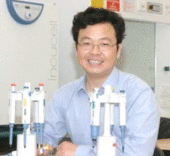Young Children’s Voices in Mathematical Problem Solving
Contributed by Dr Ho Siew Yin and Sng Wei Qin Abbie, from NTUC First Campus, for SingTeach Virtual […]
Read More
Teaching pupils to write in science is the responsibility not only of English teachers, but of science teachers as well. This series of articles describes how science teachers can help pupils to write better in science. This first article offers an account of how one teacher encourages the pupils to write accurately in their lab reports.

Dr Guo Libo has done extensive research in the areas of language education and multimodality in science texts.
Being initiated into the conventions of science writing through their training, science teachers are in a unique position to model for pupils how science is written in a variety of text types, what features science writing displays, and what functions such features serve in the construction of science. Much of this teachers’ knowledge of the craft of writing science is, however, tacit; and recruiting that knowledge in classroom teaching often proves ineffective.
The following is the transcript [1] of a lesson dealing with measurement of volume in a Secondary 1 Science class. The class had a practical session the previous day measuring the volume of marbles using the displacement method. Noticing that some pupils had difficulties in the use of words in answering the questions in their Practical book, the teacher decided to discuss some of the questions in class.
Teacher: Let’s go on to the questions…. Question 1 on page 76…. “Explain why the marble must be placed gently into the measuring cylinder.” Why do you place the marble gently into the measuring cylinder? Joan [2]?
Joan: [stands up and reads from her Practical book] To prevent the water from splashing out of the measuring cylinder, resulting in inaccurate result.
Teacher: Ok. So, your answer is “to prevent the water from splashing out of the measuring cylinder, resulting in inaccurate result”…. Ok, you may be seated. Think about it…. You always say ‘inaccurate result’. In what way is the result inaccurate? And how can you make the result a little bit more accurate by preventing the splashing?… So the inaccuracy is that you end up getting the volume of marble less than the true volume. Can you talk more precisely, instead of using words like ‘inaccurate results’, which…doesn’t mean very much.
Neither can you think clearly…, whether the inaccurate result is, is the volume more or is it less, or what happens? You get what I’m saying?… Ok, this would be a lot more precise and specific in your language when you say ‘Marbles are placed gently in the measuring cylinder to prevent splashing,’ yes, but why do you want to prevent splashing? Because splashing would affect the result in this way [pointing to the slide] ok, it will cause the volume of the marble being determined to be smaller than the true volume… State whether it is really smaller or larger volume that would result in the inaccuracy. Don’t just use words like “inaccurate”. Can? Ok, the next question.
In the above vignette, the teacher asks the pupils to pay special attention to the words they use in their writing. There are several points we can comment and reflect upon.
First, pupils may not know that the expression “inaccurate result” is not precise enough unless being told so explicitly. To the average Secondary 1 pupil, who is just an apprentice in observing nature and recording his or her observations, the phrase “inaccurate result” may already seem very accurate. Therefore the science teacher clearly needs to teach the pupils the conventions of writing science as well as doing science. When I was in the classroom, I noticed that a significant number of pupils immediately followed the teacher’s advice and wrote in their Practical books that the value observed would be less than the true value.
Second, the teacher starts with one pupil’s response and explains why that response is insufficient. At least in her class, this was an efficient method of pointing out and correcting errors in students’ writing. Other pupils may then realise that the teacher is talking about a common error.
Third, phrases such as “inaccurate result” can be taken as non-technical or semi-technical and may not be perceived by teachers as particularly “hard”. But research has shown that pupils may find it hard to include these semi-technical words in their writing, along with technical words in science.
According to Wellington (2000, p. 168), technical words in science fall into four broad categories:
Teachers should spend at least some time investigating how pupils use the different types of words in their writing, how and why they may stumble, and how best we can help them.
As hinted at by the teacher in the above transcript, where pupils cannot use words appropriately in their writing, they cannot think appropriately either. This means that they have not mastered the concepts in question and that learning has not taken place sufficiently. Hence the need for the science teacher to be aware of possible difficulties words pose for the pupils.
On the other hand, words are part but not all of science writing; they are not the whole story. After all science writing does not consist of words piled up in a random manner.
In the next article, we will discuss how to teach science writing through the use of writing frames organised into text types such as reports, explanation, argumentation and experimental reports (Wellington & Osborne, 2001).
1 The use of the ellipsis ‘…’ indicates that some parts of her speech have been removed to save space. Square brackets ‘[ ]’ are used to give the contextual information accompanying the talk.
References
Wellington, J. (2000). Teaching and learning secondary science: Contemporary issues and practical approaches. London: Routledge.
Wellington, J., & Osborne, J. (2001). Language and literacy in science education. Buckingham: Open University Press.